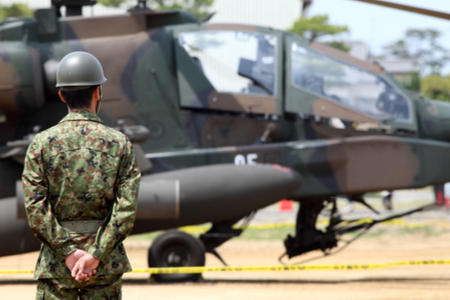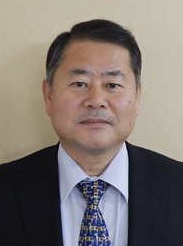“API Geoeconomic Briefing” is a weekly analysis of significant geopolitical and geoeconomic developments that precede the post-pandemic world. The briefing is written by experts at Asia Pacific Initiative (API) and includes an assessment of burgeoning trends in international politics and economics and the possible impact on Japan’s national interests and strategic response. (Editor-in-chief: Dr. HOSOYA Yuichi, Research Director, API; Professor, Faculty of Law, Keio University; Visiting Fellow, Downing College, University of Cambridge)
This article was posted to the Japan Times on February 1, 2022:
API Geoeconomic Briefing

Photo: Shutterstock
February 1, 2022
Why economic security in Japan needs to include the defense industry
OUE Sadamasa
Senior Research Fellow, Asia Pacific Initiative (API);
Lieutenant General, Japan Air Self-Defense Force (Ret.)

National security and economic security are strategies that overlap significantly — they are not two separate topics — with the defense industry being at the center of the overlap.
In spite of that, the industry appears to be absent from efforts to achieve economic security.
No defense or military specialists are included in the 18 members who represent industry, bureaucracy and academia in the government’s expert panel to discuss economic security legislation.
The Sankei Shimbun newspaper reported on Dec. 10 that the Defense Ministry is considering creating separate economic security legislation focusing on the defense industry, which could lead to the industry being isolated from other sectors and left out of global development.
Innovative technologies that determine the future of national security and military affairs are dual-use technologies with potential for both civilian and military applications, and most of them are researched and developed by private companies unrelated to defense businesses.
To counter China’s civil-military fusion in its defense industry, it is indispensable for industries, bureaucrats and academics to work together. Military expertise is also necessary to manage sensitive technologies.
The defense industry’s business involves highly confidential matters, but that doesn’t mean it should be treated separately from other industries.
We should recognize the reality that it is becoming meaningless to draw boundaries between military and nonmilitary issues and aim to achieve economic security that nurtures, maintains and utilizes national security-related production and technology foundations.
Many people in the defense sector have long shared a sense of crisis over Japan’s declining defense industry.
The increase in higher-performance defense equipment led to a rise in purchasing prices and maintenance costs, as well as a drop in the volume of procurement.
The defense-related budget has not been boosted enough to cover the rising expenses for research and development, and it has been becoming more difficult to maintain and hand down skills as some companies are withdrawing from the defense business.
Amid such headwinds, the government adopted the three principles on transfers of defense equipment and technology in April 2014, easing the country’s long-held arms export ban. With these new principles in mind, the Defense Ministry and the Acquisition, Technology and Logistics Agency (ATLA) created its strategy on defense production and technological bases in June the same year.
The strategy reflects the strong desire of ATLA to revive the defense industry, following Japan’s first-ever establishment of a national security strategy and the revision of its national defense program guidelines in 2013.
The move brought some results, such as the launch of the National Security Technology Research Promotion Fund in fiscal 2015, to finance basic research into dual-use technologies, and Mitsubishi Electric Corp.’s signing of a contract with the Philippines in 2020 to deliver an air radar system.
These moves, however, are still far from revitalizing the nation’s defense industry as intended under the strategy on defense production and technological bases.
The Defense Ministry has been making efforts such as facilitating competition among companies through offering incentives and promoting exports of defense equipment under the three principles.
The ministry has been organizing meetings between the defense minister and executives of the Japan Business Federation, or Keidanren, to step up cooperation with industrial circles.
Still, more companies are withdrawing from the defense business, and there are few successful cases of arms exports.
Driven to the edge
Many point out that Japan’s defense industry has been driven to the edge, and we have to say that what the Defense Ministry can do by itself is limited.
One typical example is the restrictions on overseas transfer of defense equipment.
There are some 10,000 defense-related companies in Japan, and they need to explore overseas markets rather than relying on the extremely limited demands of the Self-Defense Forces.
There are firms that offer products competitive enough in terms of prices, quality and performance.
A firm which produces parachutes with a high level of safety and operability had been working for years to sign a contract with an overseas military to ship the product, but failed to do so since parachutes were judged as not falling under “defense equipment and technology related to cooperation concerning rescue, transportation, vigilance, surveillance or minesweeping” as described in the implementation guidelines for the three principles.
The Ministry of Economy, Trade and Industry (METI), which oversees national security-related trade control, is in charge of transfers of defense equipment.
After repeatedly consulting METI and ATLA, the firm was told that the case needed to be deliberated at the National Security Council and decided to give up, considering it would be too burdensome.
To begin with, the three principles were designed to prevent overseas transfers of defense equipment and are not intended to promote exports.
METI needs to find a way to balance defense equipment export control and the strengthening of the defense industry.
The SDF, which doesn’t own arms and ammunition factories, cannot carry out any missions without the defense industry. The decline of the industry is synonymous with the weakening of the SDF.
The current national security system of Japan has been set with the launch of the NSC and the creation of the national security strategy in 2013, and the establishment of the national security secretariat in the Cabinet Secretariat in 2014.
However, there is one issue that has never been addressed at the NSC.
In March 2014, Takashi Uto, an Upper House lawmaker from the Liberal Democratic Party, said in a question at the budget committee that the law to establish the NSC states in Article 2, paragraph three, that the prime minister must ask the council for deliberation when creating industrial coordination guidelines related to the defense program guidelines, but that such guidelines have never been created by the government.
In response, METI said the ministry had never considered creating such an industrial guideline, adding that it will have to cooperate with other ministries if it becomes necessary.
Then-Prime Minister Shinzo Abe also noted that it is something that cannot be determined by METI alone and should be discussed at the NSC from a strategic perspective, but the issue has been left untouched since then.
Prime Minister Fumio Kishida said his government will revise the national security strategy. In doing so, the government should revisit the issue of what to do with industrial guidelines.
Little interest in defense
The market size for Japan’s defense businesses is small.
In the nation’s defense budget, the amount allocated for defense equipment procurement totals some ¥2 trillion, excluding the funds set aside for the United States’ Foreign Military Sales (FMS) program.
The ratio of defense-related sales in corporate sales is about 5% on average. Most Japanese companies have no interest in defense, and defense business only has a secondary role even for major companies in the defense industry.
This is why the government has not been paying much attention to the defense industry.
Companies also have a negative image of defense-related businesses, reflecting public negativity toward military affairs.
Such sentiment is also seen in the Science Council of Japan denying military research and the low achievement of Japan’s exports of defense equipment.
The factors behind this sentiment is deep-rooted, stemming from Japan’s Constitution that states in Article 9, paragraph two, that “land, sea, and air forces, as well as other war potential, will never be maintained,” and arms production in Japan having been prohibited by the Allied Powers for years after the end of World War II.
However, today’s national security covers a wide range of areas and most of the game-changers for military affairs in the future are dual-use technologies.
These technologies need to be managed even more carefully than defense equipment and technology — weapons and weapons technologies — whose overseas transfers are strictly restricted under the three principles.
As boundaries between military and nonmilitary realms are increasingly becoming unclear, it is necessary to redesign the systems for transfers of defense equipment and management of sensitive technologies to create a comprehensive framework that meets the objectives of economic security — maintaining the nation’s supply capacity for key production and technologies and managing their transfers abroad.
Furthermore, for Japan to be more proactive in achieving economic security using its strategic technologies, technological cooperation under the U.S.-Japan alliance to utilize innovative dual-use technologies becomes one of the major pillars.
According to a joint statement released following the Jan. 7 “two-plus-two” meeting of foreign and defense chiefs of Japan and the U.S., the ministers “committed to pursue joint investments that accelerate innovation and ensure the Alliance maintains its technological edge in critical and emerging fields, including artificial intelligence, machine learning, directed energy, and quantum computing.”
Japan’s own DARPA
One way to put this goal into practice would be for the government to launch an organization, using ATLA’s Future Capabilities Development Center as a platform, to conduct research and development on defense equipment and technology jointly with the U.S.
Because it would be difficult to rely on existing defense companies alone to deal with those critical and emerging fields, the organization — a Japanese version of the U.S.’ Defense Advanced Research Projects Agency (DARPA) — should secure a sufficient budget to recruit engineers from companies and other institutions so that the two countries’ public and private sectors can work together.
It should invite engineers and academics who are unhappy with the current working conditions and who could potentially be recruited by China.
That way, companies can avoid being burdened with risks and costs that come with the development of cutting-edge technologies.
The process of the Self-Defense Forces and the U.S. military testing new technologies and putting them to use would be smoother and quicker under the framework.
The entire government must work in unison to achieve economic security since it involves a variety of areas and a number of ministries and agencies.
Private institutions including companies and universities also play a proactive role, meaning the government and the private sector should work closely together.
Economic security cannot be achieved without military affairs.
The Defense Ministry and METI need to cooperate in developing the defense industry into the country’s core infrastructure for national security production and technology bases.
At the same time, it is important to eradicate the deeply ingrained dislike among the public toward military businesses and raise people’s awareness in the field by breaking down barriers that isolate the defense industry and opening doors for companies that own high-quality dual-use technologies.
Strengthening foundations to protect the country and its people’s lives in case of emergency is the key to economic security.
Disclaimer: The views expressed in this API Geoeconomic Briefing do not necessarily reflect those of the API, the API Institute of Geoeconomic Studies or any other organizations to which the author belongs
 APIニュースレター 登録
APIニュースレター 登録